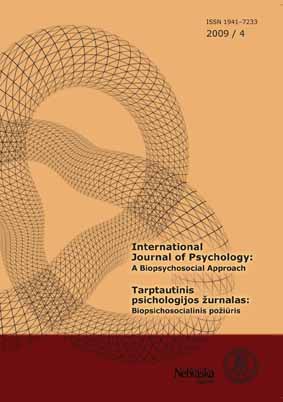Kokie veiksniai skatina darbuotojų gerovę ir palankią darbo aplinką?
What Psychosocial Factors Promote Employee Well-Being and Positive Work Environment?
Author(s): Aistė Pranckevičienė, Loreta GustainienėSubject(s): Psychology
Published by: Vytauto Didžiojo Universitetas
Keywords: gerovė; darbo aplinka; well-being; work environment
Summary/Abstract: 2010 metų spalio–gruodžio mėnesiais Vytauto Didžiojo universiteto Teorinės ir Bendrosios psichologijos katedros mokslininkų grupė (projekto vadovė doc. dr. L. Gustainienė, grupės nariai: doc. dr. L. Bukšnytė, dr. A. Pranckevičienė, G. Genevičiūtė-Janonienė), remiama Valstybinio mokslo ir studijų fondo, atliko mokslinį tyrimą „Pozityviųjų psichosocialinių veiksnių, skatinančių darbuotojų gerovę ir palankią darbo aplinką, analizė“. Svarbiausias projekto tikslas – sukurti išsamų darbuotojų gerovės ir palankios darbo aplinkos modelį, besiremiantį biopsichosocialine sveikatos samprata, ir akcentuojantį pozityviųjų psichosocialinių sveikatą stiprinančių veiksnių skatinimą organizacijose. Įdiegti tokį modelį yra naudinga tiek darbuotojui, tiek organizacijai: tai skatintų vystyti psichologinę gerovę organizacijos kultūroje, didintų darbuotojų pasitenkinimą darbu bei lojalumą organizacijai. Traditional understanding of health mostly stresses problem solving strategy, thus neglecting the search for factors, strengthening both of the individual and the organization well-being. Compared to other EU countries, subjective happiness level in Lithuania is rather low, therefore, a thorough study of positive psychological and social factors, encouraging personality development applicable to an organizational setting, creates a new impulse for the search of harmonious combination of the person and the organization. The main purpose of the project is to develop a comprehensive model of employee and workplace well-being, based on biopsychosocial understanding of health and promoting positive health-related factors in an organization. Develompent as well as implementation of such model would be beneficial both for the employee and the organization. Application of the model would also accelerate introduction of psychological well-being concept in organizational culture, enhance job satisfaction and organizational commitment.
Journal: Tarptautinis psichologijos žurnalas: biopsichosocialinis požiūris
- Issue Year: 2010
- Issue No: 7
- Page Range: 137-142
- Page Count: 6
- Language: Lithuanian

